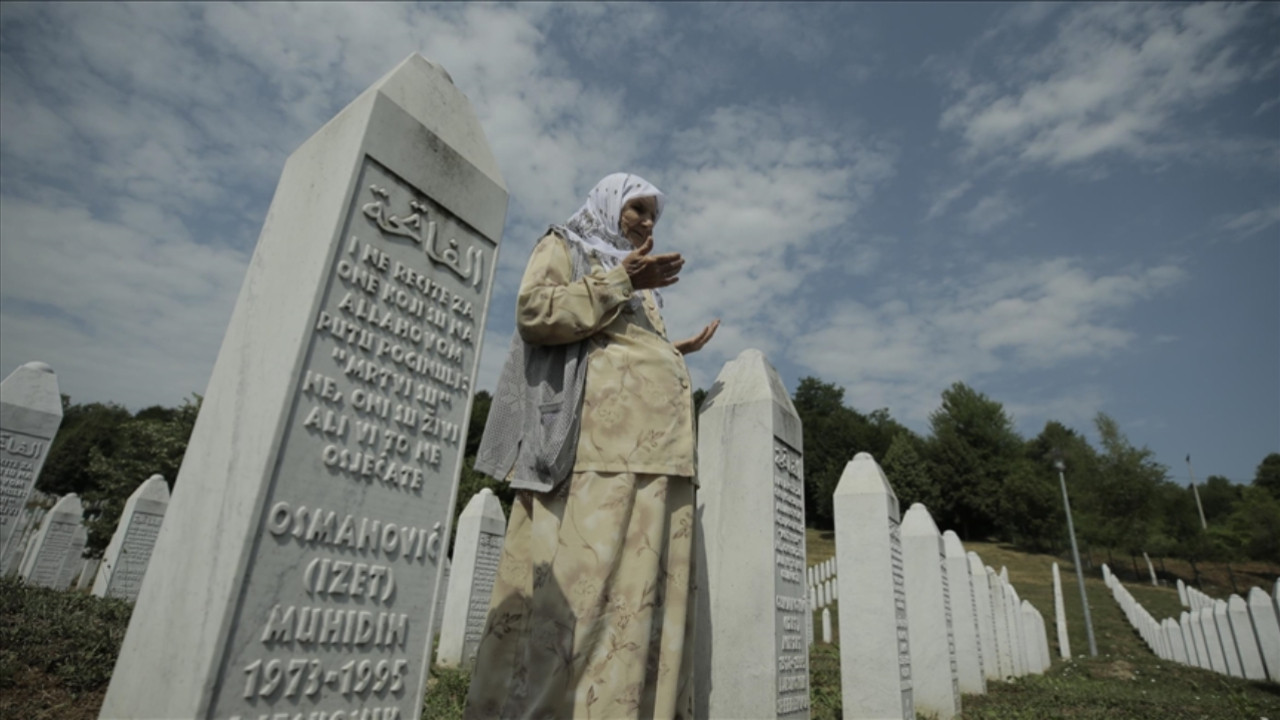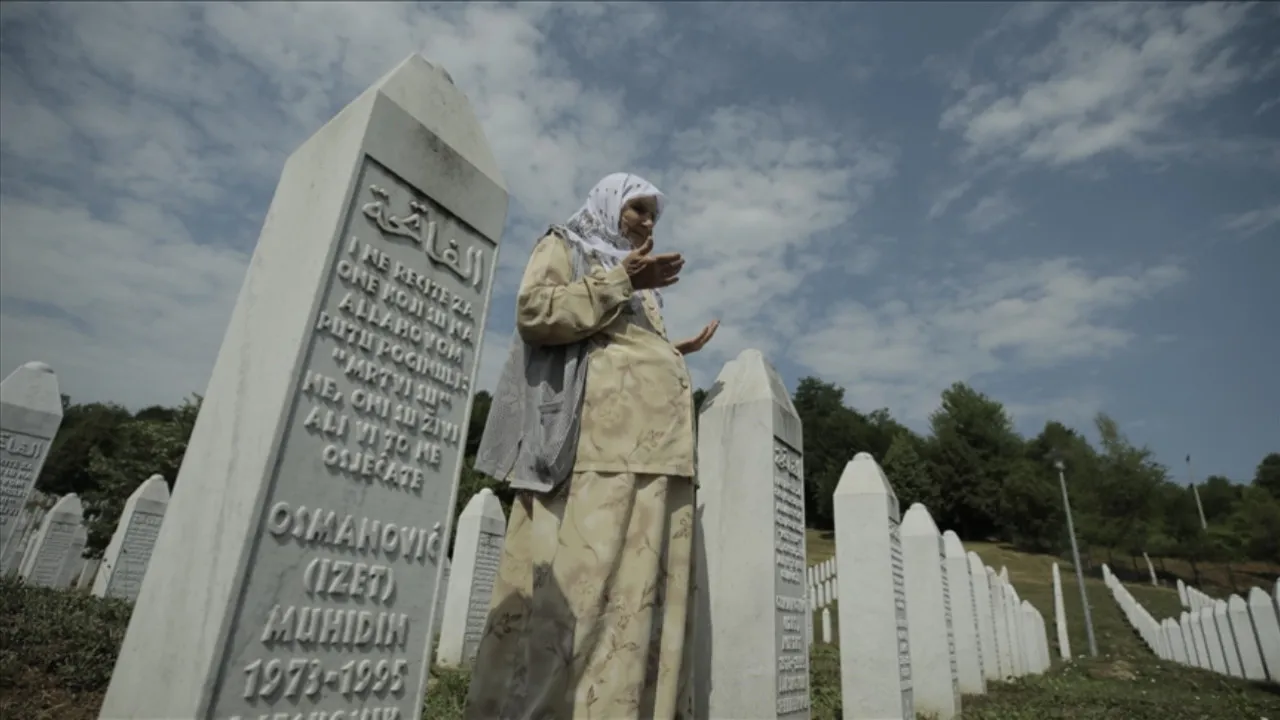Will there be a new war in Bosnia?
UN General Assembly will vote on the proposed resolution designating July 11 as "Srebrenica Genocide Remembrance Day" on May 23. Serb politicians, who previously denied the genocide, imply that the passage of the draft resolution will spark a new conflict. Since the Dayton Agreement, the question of "Will there be a new war in Bosnia?" has been frequently raised. Does it differ this time around?
Özgür Dirim Özkan*
The recurring claim that "War will return to Bosnia" is once again a topic of discussion. Whenever the word "war" is articulated by Bosnian Serb leader Milorad Dodik, unbeknownst to others, this he suddenly takes attention!
Proposed resolutions to be voted at the United Nations General Assembly tomorrow (May 23, 2024) will denounce acts of glorification pertaining to individuals convicted of war crimes, crimes against humanity, and genocide, including those accountable for the Srebrenica genocide.
The vote, initially scheduled for April 27, was subsequently rescheduled twice (on May 2 and May 23) due to the unavailability of the draft text. Montenegro submitted amendments to the draft text while Rwanda and Germany were preparing it, clarifying that the perpetrators of the genocide were not Serbs but rather individuals.
The draft text was officially released on May 17, and the aforementioned modifications were
appended per Montenegro's request. In other words, the perpetrator of the "genocide" remains
unknown. It is the work of a small number of criminals and is not the responsibility of any particular ethnic, religious group or community!
The 2007 decision by the Hague International Court of Justice that only the massacre in Srebrenica constituted genocide, forms the basis of the draft resolution that will be voted on tomorrow.
Currently, both Serbia and the Bosnian Serb Republic (RS: Republika Srpska) deny genocide, contending that the atrocity was under responsibility of certain individuals and that the death toll was grossly inflated. Milorad Dodik, who presided over the April 18 rally in Banja Luka, the capital of the Republic of Srpska, where the draft resolution was criticized, admitted that the 1995 VRS (Armija Republike Srspke: Army of the Republic of Srpska) operation in Srebrenica was a "criminal mistake" but vehemently denied genocide. We are well-acquainted with the predominant position regarding genocide: "We defended our homeland, we did not commit genocide."
Serbian nationalists may, in certain circumstances, go so far as to deny the truth that they were the victims of genocide. Dodik conveyed his respect for "all" of the victims and his condolences to their families, in his address on April 18. Everybody knows that by "all victims" he signifies Bosnian Serbs included. On the same day, he stated in a speech to the RS parliament that the genocide was not real and that the draft resolution up for vote at the United Nations should be cancelled.
It was known that this vote would disturb Serbian nationalists. Because the draft resolution includes the condemnation of genocide denial and praising the actions of people guilty of genocide, and Serbian nationalists, especially RS President Milorad Dodik and Serbian President Aleksandar Vucic, know that in the next stage, genocide denial will not only be condemned, but also the implementation of sanctions will be paved. This is the reason for the vociferous opposition to the bill.
In fact, they could be quite correct. It is conceivable that subsequent to the bill's ratification, a revised resolution may be considered, which would establish genocide denial as a criminal offense. Numerous Serbian politicians, Dodik and Vucic in particular, might then have legal recourse. But isn't that what should have happened by now?
The UN International Criminal Tribunal for the Former Yugoslavia convicted nearly fifty Serbian politicians and commanders for the Srebrenica genocide and other war crimes in Bosnia, including Radovan Karadzic, the president of the RS, and Ratko Mladic, the commander-in-chief of the VRS, also known as the butcher of Srebrenica. Presently, the majority of Serbian politicians continue to venerate Karadzic and Mladic as national heroes. As the inaugural Serb member of the Presidential Council of Bosnia and Herzegovina, Bilyana Plavsic, the second president of the RS, was convicted of involvement not only in the Srebrenica massacre but also in the Foca and Markale massacres. She was sentenced to 11 years in prison but was released in 2009 after serving two-thirds of her term on account of her old age and health condition. Banja Luka greeted her and Momcilo Krajisnik, who was sentenced of 27 years and subsequently released on similar terms in 2013.
Evidently, the individuals convicted of war crimes are the president or the commander-in-chief. However, in accordance with the 2007 United Nations resolution, genocide crimes are classified as crimes committed on an individual level. As if Karadzic, Mladic, Plavsic, or Krajisnik were sitting at home and decided to kill people after having mental collapse... No! These criminals committed crimes for the sake of an ideal, fort he sake of the political structure in which they were authorized at the highest level. They did it for the Bosnian Serb Republic and it is a great scandal that the RS was not abolished despite the 2007 Srebrenica Genocide decision. In the absence of accountability for the genocide, RS was indeed rewarded in spite of the atrocities it has committed.
Serbian politicians, who are aware of the lack of political will behind the recognition of the genocide but not punishing the RS for it, have relied on this and have not hesitated to deny the genocide or to support those who are guilty of the crime of genocide. Will they continue to feel this way if the bill is passed?
This is one reason why Serbia and RS are so outspoken, even bringing up the subject of war once more.
Milorad Dodik stated in an Instagram post that the Serbs will have no future in Bosnia and that the political pressure on the Serbian people will increase with the passage of this bill. Indeed, in his speech on Victory Day on May 9, he emphasized that the time had come for the liberation of RS from Bosnia-Herzegovina: "A new war awaits the Serbian people: The war of independence from Bosnia-Herzegovina!"
The West has been troubled by Dodik's statements for an extended period of time. For this reason, Dodik was in fact denied entry into the United States. Dodik, as anticipated, garners the most support in this declaration from Serbia and, expectedly from Russia. The significance of Hungary and Viktor Orban's support should not be undervalued. Oliver Varhelyi, European Commissioner for Neighbourhood and Enlargement and one of Orban's most devoted supporters, and Peter Szijjatro, the Foreign Minister of Hungary, both predicted that the passage of the bill would cause instability in the region. Varhelyi elaborated to N1 channel broadcasting in former Yugoslav countries that this decision, which will lead to the perception of the Serbian people as a collective criminal, could spark a return to the fearful days of the Balkan Wars.
These statements prompt the inquiry: Will a new conflict ensue in Bosnia if this decision is executed?
Occasional inquiries have been directed towards this matter ever since the Dayton Agreement concluded the Bosnian War. The familiar headline in Western newspapers that accompanies every political crisis in Bosnia reads, "Bosnia is on the verge of war."
"Experts warn that a new war could break out at any moment in Bosnia, where the greatest political crisis since Dayton has occurred," is the cliched statement that appears in the headline.
They assert that "this time the situation is different" despite the fact that this cliche news no longer attracts many buyers. The resurgence of the concept of hot conflict, particularly in the context of the Ukrainian War, has significantly contributed to the development of this perception.
While the debate continues, there is an eerie silence in the capital Sarajevo. Prior to the outbreak of the war in 1991, Bosnians did not anticipate its occurrence. In fact, many Bosnians say: "We realized that the war had broken out two weeks after the war started." Those Bosnians with such prior experience observe the procedure anxiously.
Nevertheless, "this time it is different." In numerous ways, the Bosnia of 2024 and the Bosnia of 1991 are dissimilar.
From a military standpoint, the VRS does not possess the heavy weapons, tanks, and cannons anymore that remained from the Yugoslav People's Army in the event of a future conflict. Additionally, the political conjuncture has undergone significant transformations. Above all, it does not seem logical that the West, which is currently dealing with Ukraine crisis, would allow such a war "in the middle of Europe". However, similar discourse prevailed in 1991. It was said that "such a war is not possible in the middle of Europe in the 20th century”. But experience shows that being in the "middle of Europe" is not very important.
On the other side it should not be disregarded that West benefited in 1991 from the destabilization of the Balkans and the disintegration of a major military power such as Yugoslavia and in 2024, destabilization of the Balkans, where the West has control over, is not a preferable situation.
Moreover, the political elite in the Balkans is averse to the prospect of a new war. For the political elites who were in a rush to gain a share of a country that fell apart in 1991, war was a pracrtical and efficient instrument. It was an instrument that granted the emerging nationalist political elite access to the political power. Presently, it is self-evident that these political elites, who hold political power, cannot risk losing it in a new armed conflict.
The political elites, who have maintained power for years through nationalist instigation and ensured the stability of their kleptocratic regimes through populist consolidation around war, are more concerned with preserving their positions through the continuation of the "war discourse" than with the war itself.
In this instance, the answer to our question is unambiguous: No new war will break out in Bosnia. However, kleptocratic regimes may continue to ask, "Will there be another war in Bosnia?" to bolster their nationalistic political rhetoric. The inquiry remains valid for the following day, today, and tomorrow. How long until purchasers are found for this rhetoric? In light of the response to this inquiry, the Balkans' future is at stake.
--
*Özgür Dirim Özkan, who received his undergraduate education at METU Department of Sociology, has his master's degree at METU Urban Policy Planning and Local Governments Department and then completed PhD at Yeditepe University Social Anthropology with his thesis titled "Football Fandom and Identity Differentiation in Sarajevo: Sarajevo and Željezničar Fans." Özkan, who has a dual residence in Sarajevo and Ankara, has been working as a sociologist since 2010, writing on the Balkans in general, Bosnia-Herzegovina in particular, and football culture.


